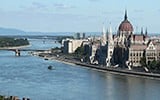Opening a bank account in Hungary is an easy and fast process. Because of the large amount of expats living in the country ...
Living in Hungary guide for expats
All the information you need to relocate and live in Hungary.
Our selection of articles for expatriation in Hungary
Hungary's healthcare system has many advantages. It is easy to get in the system (happens automatically once you start ...
Finding a job in Hungary as an expat can be a bit challenging, especially if youre not an EU/EFTA citizen. Although the countrys ...
Congratulations! You have been hired by a company for a job in Budapest. Depending on the position you will occupy, your first ...
When most people hear about Hungary, they people think about the Parliament building, Buda with its castle and the river Danube ...
Moving to Budapest for the first time can give you a cultural shock, especially if you are coming from a Western country ...
Choosing the best place to live in Budapest might not be an easy task as it will depend on the lifestyle you are looking to have ...
Finding accommodation will be one of your priorities, whether you are moving to Budapest alone or with your family. Once ...
Buying a house or a flat can be a good option if you are planning to long term stay in Budapest. However, it is best to have the ...
Over past years, Budapest has become a popular destination for professionals looking to boost their career abroad. As mentioned ...
There are so many types of jobs available in Budapest that people from other parts of the country and around the world come here ...
Hungary might not be one of the most popular destinations for studying abroad, but Budapest is home to some prestigious ...
Besides quality universities, Budapest provides international students with a high quality of life and a range of benefits. So if ...
To settle down in a new place is never easy, especially when talking about moving to a new country. Budapest is generally a ...
If you would like to get to know people in your profession and build a circle, first of all, you have to open up and start a ...
About Hungary
History
Hungary has had a long and complicated history. It has been part of the Roman Empire, conquered by the Huns, become part of the Ottoman and Austro-Hungarian Empires subsequently, and was occupied by Germany and the Soviet Union. It was at the crux of the first World War when the heir to the throne, Franz Ferdinand, was murdered. As for the second World War, Hungary was initially with the Axis powers, but negotiated peace with the Allies, and was subsequently occupied by the Nazis.
But Hungary is not all about war. This is also the country which, when all other European nations were busy crusading the Holy Lands, introduced the first constitution in continental Europe; the Golden Bull, issued by Andrew II in 1222. During the rule of Corvinus (1458'1490) Hungary was the only non-Italian nation to embrace the values of Renaissance and Humanism. This complicated and sometimes tumultuous past is celebrated and commemorated in different ways throughout the country, from museums documenting life under Nazi and Soviet rule to castles and palaces celebrating Hungary's roots.
After a Soviet military occupation that lasted from 1945-1989 in some form or other, Hungary was pronounced a republic in 1989, with Hungarian as its official language and Budapest as its capital city. Budapest is home to a third of the country's population. With Buda to the west and Pest to the east, the city is divided by the Danube river, which flows through the middle. The city's economy is developing at a fast rate and is home to many large multinationals, with notable big names in the finance and biotech sectors, which is good news for expats looking for a job in Budapest.
Geography
Hungary is divided into three regions by its two main rivers; Danube and Tisza. The region 'beyond the Danube' is mountainous, containing the easternmost part of the Alps whereas the northern part of the country is at the foothills of the Carpathians. Hungary is also home to the world's largest thermal water cave system and the second largest thermal lake which, because of the combined influence of the Roman and Ottoman rule, played a big part in the strong 'bath' culture of the country, with spas and Turkish baths at (almost) every turn.
The country also has large rural spaces, with forest covered hills that are perfect for nature-lovers, whereas its mild, continental climate makes it ideal to visit in the spring and summer.
Economy
Hungary became one of many countries to join the EU in 2004, but it has still kept its own currency, the Hungarian Forint. The forint is quite a weak currency, with 1,000 HUF equating to about 3 euros. As is the case with most former members of what was known as the Soviet block, there is a struggle to transition from a centrally planned economy to a market driven one, but despite that fact, the Hungarian economy has been making great strides recently. There are improvements in investment freedom and labour freedom, as well as in judicial effectiveness. There is also a political stability, as the same government was just re-elected for a third term. All and all, Hungary seems to be on its way up once again, thus attracting both businesses and expats.
Latest housing offers in Hungary










